15 Nov 2018 | Focolare Worldwide
According to the latest estimates more than 440 thousand, of the more than 2 million and 300 thousand people, who fled Venezuela from 2014 until now, have crossed the Peru border. They arrive after a very exhausting journey, uncertain about their future and surrounded by many dangers, including the recent need to cross a river by boat. “If the water is too high, and they can’t manage it, they’re loaded onto the shoulders of a man who naturally wants to be paid.” Once again Silvano from the focolare community in Lima writes: “Right from the start of this forced exodus “we have been accompanying an ever increasing number of people. Up until now, there are sixty whom we follow closely, not only spiritually, but also professionally and on a purely human level.” The situation is extremely difficult for those who arrive: “They only have the clothes on their backs. They’re cold because spring has begun and the temperatures are falling. We see the emotion in their eyes when they see the clothing that has been collected for them through a communion of goods.” The Focolare has two welcome centers in Lima, along with the Centro Fiore at Magdalena del Mar in the province of the capital. “Three family units are being hosted here, including the family of Ofelia who many Venezuelans in Peru call “the mother.” In the first quarter of this year,” Silvan recounts, “we came into contact with a psychologist, Irene, who has already been here a few months. She was invited to our operating centre, which is the focolare house, along with her parents and a few friends. She got to know the spirit behind the Focolare and, aware of the needs of her many fellow-countrymen, offered her services as a professional psychologist. A small project was immediately begun in response to the Gospel promise: “Give, and it will be given to you.” After a workshop on the topic of feelings, which was given by Irene at the end of July and a second one a few weeks later, we opened a consultancy service at Centro Fiore of Magdalena del Mar. “The “Project of Emotional Growth for Vulnerable Populations” was begun, to respond to the massive migratory situation that we are facing. In the presentation of the project, which is geared towards the most fragile members of the group such as women, children, youth and elderly, it is written that ‘providing tools for facing the situation and integrating’ into the Peruvian community is imperative. Therefore, this Project enters into the objectives of the Focolare, to “collaborate in the building of a more united world under the guidance of Jesus’ prayer to the Father that all may be one (Jn17:21), respecting and appreciating diversity, using dialogue as the method, and the constant effort of building bridges and relationships of fraternity among individuals, peoples and cultural groups.” The most common cases that have already been treated include anxiety and depression over the precarious situations, the constant concern for survival, mistreatment and developmental problems. The project provides support, information, education, and training courses, workshops on feelings and emotions, self-esteem, love of others and of oneself.” Several of the people have found employment, others are still searching, and others are planning to return to their own or to another country. “Up until now 35 sessions of psychological care have been recorded. This service continues to be offered for free to Venezuelan immigrants.”
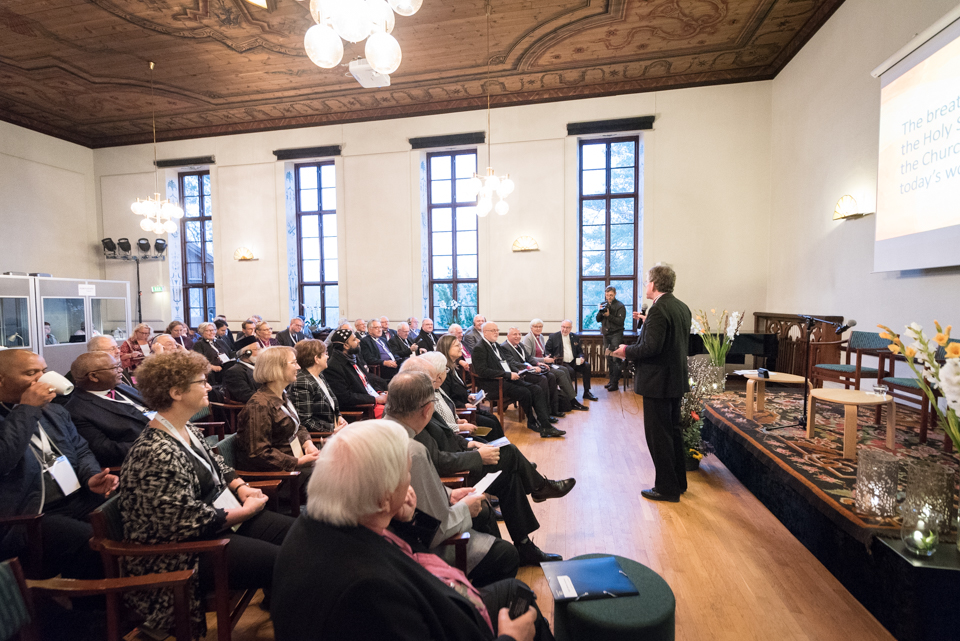
14 Nov 2018 | Focolare Worldwide
 How does the Holy Spirit work in today’s Church? Does it still make sense to talk about an ecumenical journey at a time marked by fragmentation, complexity, scandals and humanitarian challenges even for Christians? Two years after the Lund event, that gave a new impetus to the ecumenical dialogue, 40 Bishops of various Churches, from 18 different countries, met in Sigtuna, Sweden. This conference, promoted by the Focolare Movement, was held from 6 to 9 November and its theme was “The Breath of the Spirit, the Church in today’s world”. Maria Voce, president of the Focolare Movement, Jesús Morán co-president and representatives of the Focolare Community in Sweden also attended this conference. Maria Voce spoke about “The Breath of the Spirit, soul of the Church, in the experience and thought of Chiara Lubich”, while Jesús Morán presented present-day challenges from the perspective of the spirituality of unity. This conference, which has come to its 37th edition, owes its origin to an experience of synodality and communion, which John Paul II had proposed to Klaus Hemmerle, Bishop of Aachen.
How does the Holy Spirit work in today’s Church? Does it still make sense to talk about an ecumenical journey at a time marked by fragmentation, complexity, scandals and humanitarian challenges even for Christians? Two years after the Lund event, that gave a new impetus to the ecumenical dialogue, 40 Bishops of various Churches, from 18 different countries, met in Sigtuna, Sweden. This conference, promoted by the Focolare Movement, was held from 6 to 9 November and its theme was “The Breath of the Spirit, the Church in today’s world”. Maria Voce, president of the Focolare Movement, Jesús Morán co-president and representatives of the Focolare Community in Sweden also attended this conference. Maria Voce spoke about “The Breath of the Spirit, soul of the Church, in the experience and thought of Chiara Lubich”, while Jesús Morán presented present-day challenges from the perspective of the spirituality of unity. This conference, which has come to its 37th edition, owes its origin to an experience of synodality and communion, which John Paul II had proposed to Klaus Hemmerle, Bishop of Aachen. 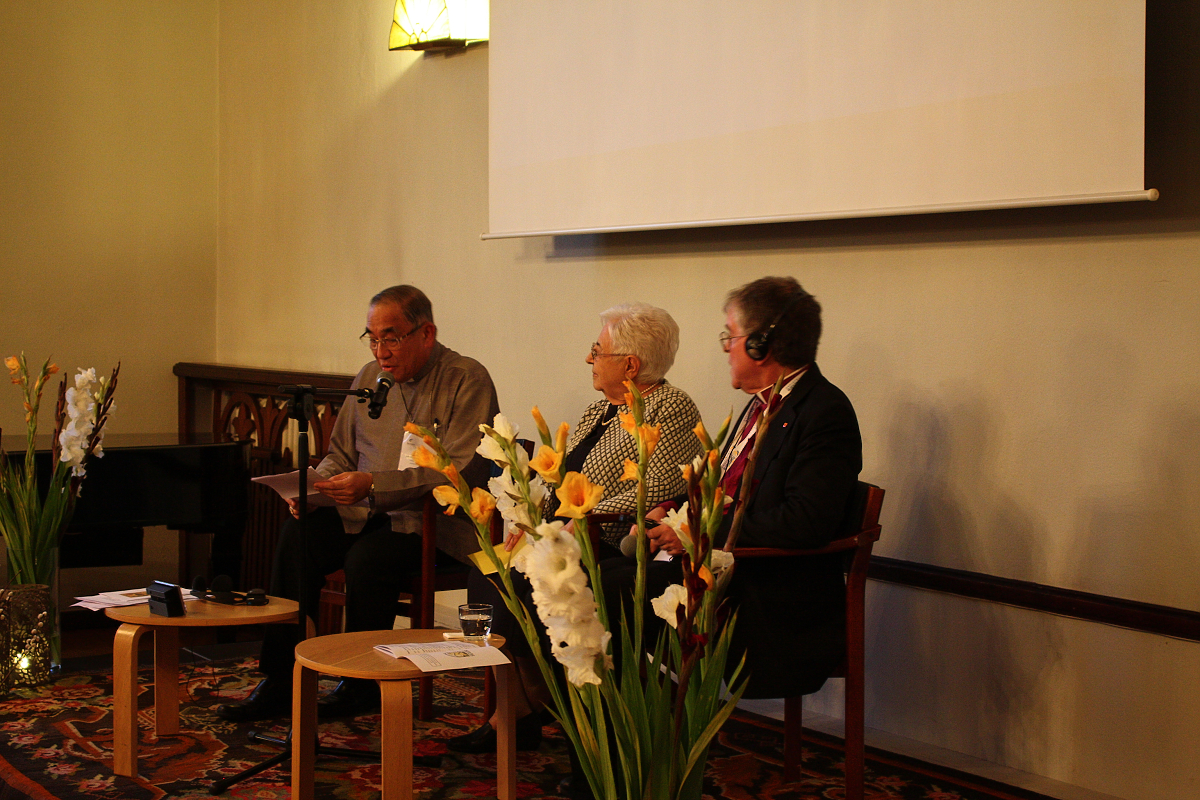 “In addition to our different recounts, we wanted to give ample space to dialogue and sharing about the ecumenical challenges we live in our countries and continents”, said Cardinal Francis Kriengsak Kovithavanij, Archbishop of Bangkok and moderator of the conference. Mons. Brendan Leahy, the Catholic Bishop of the diocese of Limerick, Ireland dealt with the important theme of reconciliation. While speaking about the power of forgiveness in the context of the scandals that hit the Irish Church, he said: “The Spirit urges us not to be robbed of hope (see Rom 8). Discouragement is a great temptations, but the Spirit keeps our hope alive and helps us restart to live a new committment in the Christian adventure of unity and reconciliation”. The Anglican Bishop Trevor Williams, an Irish man, spoke about his experience as a pastor. For several years he has been having under his care the ecumenical community of Corrymeela, in Northern Ireland, who has contributed much towards the path of reconciliation between the different factions in conflict. “Reconciliation is not an option; it is a necessity if we want peace to last. We live in a world of “they” and “we”. But in truth there is only “we”. Revealing this truth is work of reconciliation, work of the Holy Spirit”.
“In addition to our different recounts, we wanted to give ample space to dialogue and sharing about the ecumenical challenges we live in our countries and continents”, said Cardinal Francis Kriengsak Kovithavanij, Archbishop of Bangkok and moderator of the conference. Mons. Brendan Leahy, the Catholic Bishop of the diocese of Limerick, Ireland dealt with the important theme of reconciliation. While speaking about the power of forgiveness in the context of the scandals that hit the Irish Church, he said: “The Spirit urges us not to be robbed of hope (see Rom 8). Discouragement is a great temptations, but the Spirit keeps our hope alive and helps us restart to live a new committment in the Christian adventure of unity and reconciliation”. The Anglican Bishop Trevor Williams, an Irish man, spoke about his experience as a pastor. For several years he has been having under his care the ecumenical community of Corrymeela, in Northern Ireland, who has contributed much towards the path of reconciliation between the different factions in conflict. “Reconciliation is not an option; it is a necessity if we want peace to last. We live in a world of “they” and “we”. But in truth there is only “we”. Revealing this truth is work of reconciliation, work of the Holy Spirit”.  The German Evangelical-Lutheran pastor Jens-Martin Kruse shared his pastoral experience in Rome, an ecumenical laboratory that functions also thanks to Pope Francis. The Archbishop Antje Jackelén, Primate of the Church of Sweden, Cardinal Anders Arborelius, the Catholic Bishop of Stockholm, and Bishop Munib Younan, former president of the Lutheran World Federation, who presided over the historical ecumenical liturgy in Lund together with Pope Francis in 2016, spoke about the journey of common reflection that continues after the 500 years commemoration of the Reformation. “I assure you the Holy Spirit guided us and continues to guide us towards an ecumenical springtime. It is up to us now to reap the fruits of unity. Today we say: let us journey together as living witnesses in our fragmented world so that the world will believe.” One of the highlights of this conference was the ecumenical prayer in the ancient Church of Sigtuna and the signing of the “Pact of Unity”. With the signing of this Pact, the Bishops committed themselves to journey along the path of effective and affective communion, “to love the Church of the other as one’s own”. This commitment was sealed with one’s own signature and a fraternal embrace. Stefania Tanesini
The German Evangelical-Lutheran pastor Jens-Martin Kruse shared his pastoral experience in Rome, an ecumenical laboratory that functions also thanks to Pope Francis. The Archbishop Antje Jackelén, Primate of the Church of Sweden, Cardinal Anders Arborelius, the Catholic Bishop of Stockholm, and Bishop Munib Younan, former president of the Lutheran World Federation, who presided over the historical ecumenical liturgy in Lund together with Pope Francis in 2016, spoke about the journey of common reflection that continues after the 500 years commemoration of the Reformation. “I assure you the Holy Spirit guided us and continues to guide us towards an ecumenical springtime. It is up to us now to reap the fruits of unity. Today we say: let us journey together as living witnesses in our fragmented world so that the world will believe.” One of the highlights of this conference was the ecumenical prayer in the ancient Church of Sigtuna and the signing of the “Pact of Unity”. With the signing of this Pact, the Bishops committed themselves to journey along the path of effective and affective communion, “to love the Church of the other as one’s own”. This commitment was sealed with one’s own signature and a fraternal embrace. Stefania Tanesini
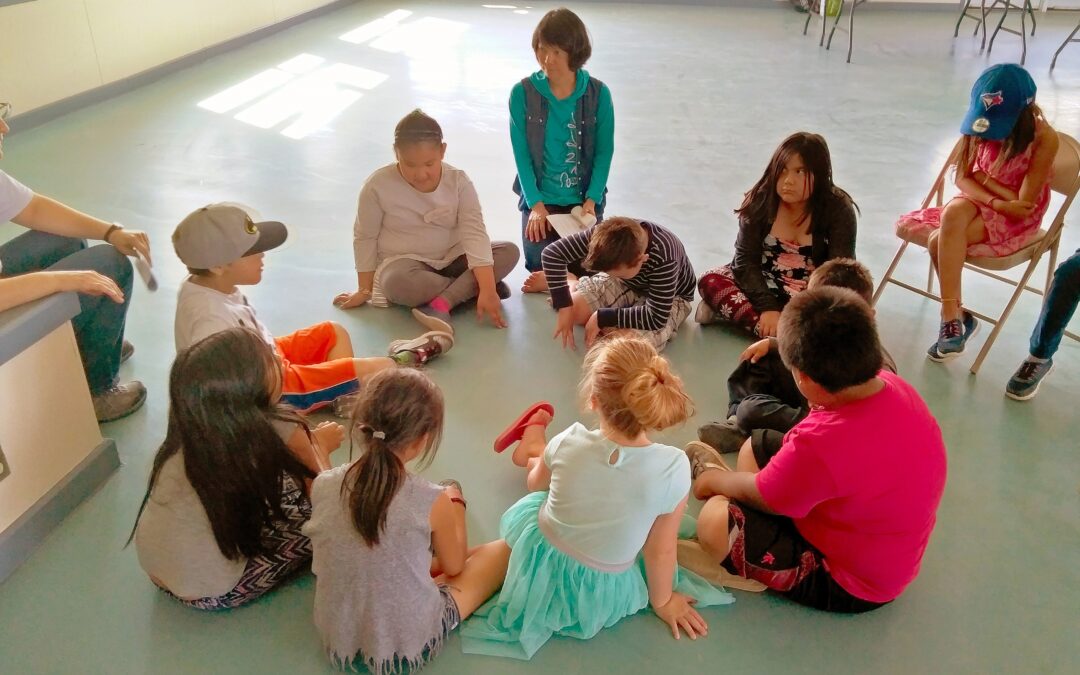
13 Nov 2018 | Focolare Worldwide
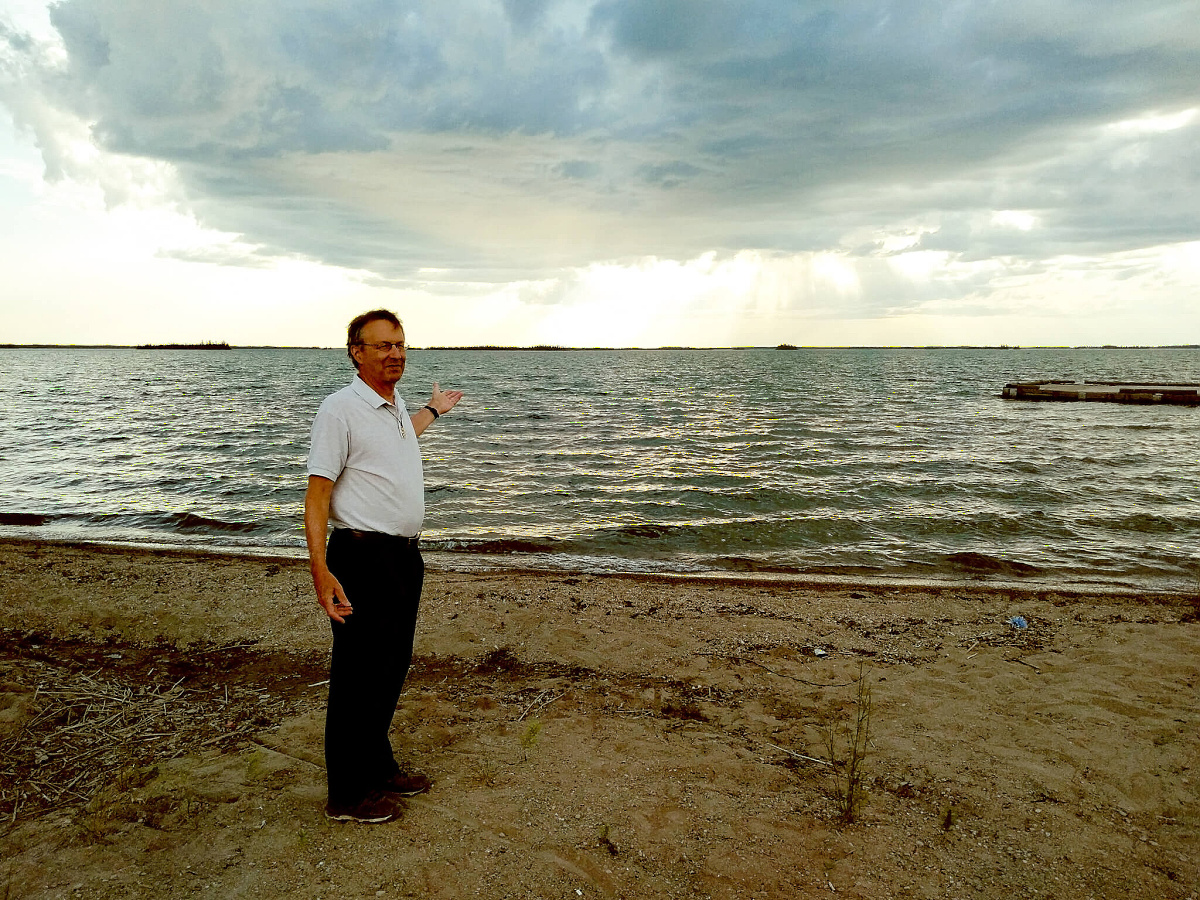 It was a lake so clear you could see the bottom and drink the water with your cupped hands from the canoe. It seemed the perfect world. Yet here and there a plastic bottle was stuck in the bank, held down by low roots. In that extraordinarily beautiful landscape, it was a punch in the eye. Alek’s story is rich with images such as this. He was among the four people who were part of a temporary Focolare at Whati, in Canada, from July 19 to August 20, 2018. “We’re talking about the Great North, almost at the Arctic Circle, a town with 800 inhabitants. It seemed even less, since the meeting of the Tlicho people (Tłı̨chǫ in their original language) had just ended, and many of the locals had left for vacation. “The Tlicho people are Native Americans (called “First Nations” in Canada), who can be found throughout North America. They are part of the Dene, an association of Native Americans in the Northwest Territories, and they live in an area called Tlicho Land, which has four towns with a total population of close to 2,000 people. Whati, which in its native language is Wha Ti, is one of these towns. It’s on beautiful Lac La Martre, which at its widest point is a good 70 km.”
It was a lake so clear you could see the bottom and drink the water with your cupped hands from the canoe. It seemed the perfect world. Yet here and there a plastic bottle was stuck in the bank, held down by low roots. In that extraordinarily beautiful landscape, it was a punch in the eye. Alek’s story is rich with images such as this. He was among the four people who were part of a temporary Focolare at Whati, in Canada, from July 19 to August 20, 2018. “We’re talking about the Great North, almost at the Arctic Circle, a town with 800 inhabitants. It seemed even less, since the meeting of the Tlicho people (Tłı̨chǫ in their original language) had just ended, and many of the locals had left for vacation. “The Tlicho people are Native Americans (called “First Nations” in Canada), who can be found throughout North America. They are part of the Dene, an association of Native Americans in the Northwest Territories, and they live in an area called Tlicho Land, which has four towns with a total population of close to 2,000 people. Whati, which in its native language is Wha Ti, is one of these towns. It’s on beautiful Lac La Martre, which at its widest point is a good 70 km.” 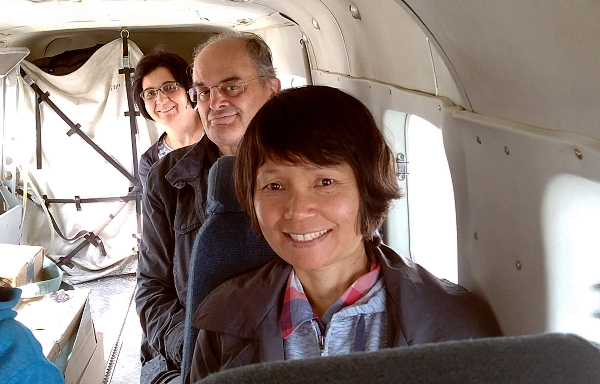 With the youth group, Alek and Fr. Alain organized the cleanup of a stretch of shoreline. “It was just a gesture,” he says, “yet afterwards we heard that one of the residents there brought this to the chief’s attention, and the cleanup has now become a regular activity throughout the year.” This too was a result of the temporary Focolare at Whati. Besides Alek (an Italian who lives in Birmingham, Alabama) and Fr. Alain (a priest from Montreal), the group was made up of Lioba from the Focolare of Vancouver and Ljubica from that of Toronto. The reason for their journey was a request from the bishop of Yellowknife, the capital of the Northwest Territories, to have a few people from the Focolare community come to the area (covering the costs) to give the residents, at least for one month of the year, the chance to come together spiritually and receive some training on Gospel living. At the same time, another group was having a similar experience at the village of Fort Resolution.
With the youth group, Alek and Fr. Alain organized the cleanup of a stretch of shoreline. “It was just a gesture,” he says, “yet afterwards we heard that one of the residents there brought this to the chief’s attention, and the cleanup has now become a regular activity throughout the year.” This too was a result of the temporary Focolare at Whati. Besides Alek (an Italian who lives in Birmingham, Alabama) and Fr. Alain (a priest from Montreal), the group was made up of Lioba from the Focolare of Vancouver and Ljubica from that of Toronto. The reason for their journey was a request from the bishop of Yellowknife, the capital of the Northwest Territories, to have a few people from the Focolare community come to the area (covering the costs) to give the residents, at least for one month of the year, the chance to come together spiritually and receive some training on Gospel living. At the same time, another group was having a similar experience at the village of Fort Resolution. 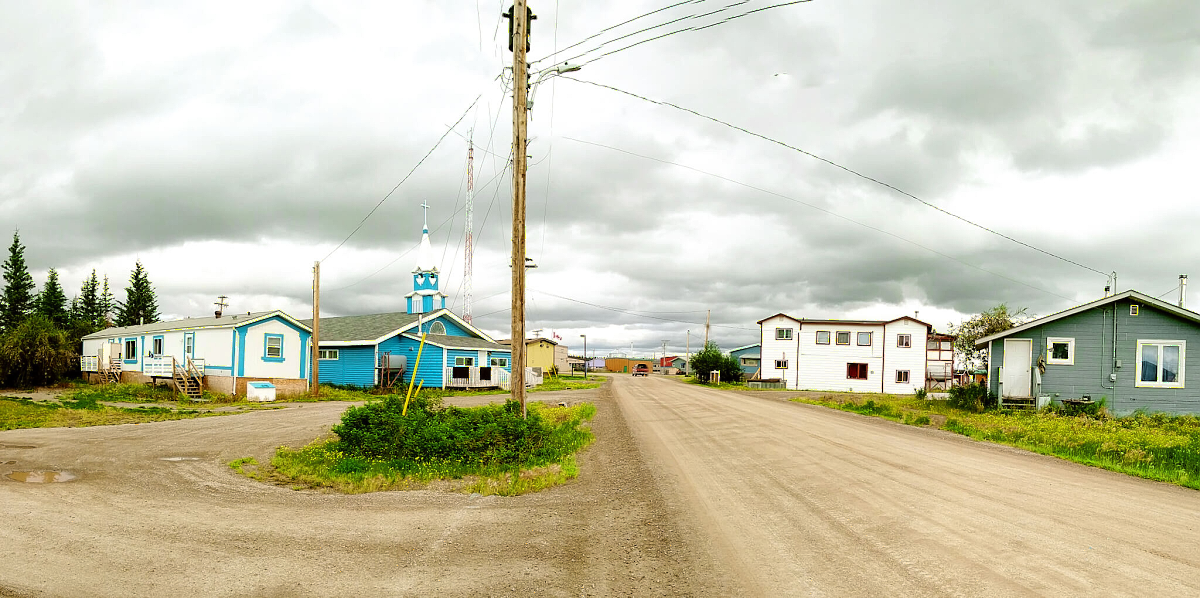 “We were at Yellowknife for a few days, having come from our cities, after trips that were pretty adventurous because of the weather. There we got the chance to know each other and receive the bishop’s blessing.” “Arriving together at Whati, we were there for a total of four weeks, to renew relationships that had begun the year before from another similar experience. We were there to get to know the local leaders and to contribute to a few projects started by the tribal leadership. The second week we organized a Bible camp for the kids, and the third week, at the request of the local leaders, we went to meet some of the elders of the village. It was moving to pray together with them. It seemed to us that there was communication that went beyond any difficulty to understand their language.”
“We were at Yellowknife for a few days, having come from our cities, after trips that were pretty adventurous because of the weather. There we got the chance to know each other and receive the bishop’s blessing.” “Arriving together at Whati, we were there for a total of four weeks, to renew relationships that had begun the year before from another similar experience. We were there to get to know the local leaders and to contribute to a few projects started by the tribal leadership. The second week we organized a Bible camp for the kids, and the third week, at the request of the local leaders, we went to meet some of the elders of the village. It was moving to pray together with them. It seemed to us that there was communication that went beyond any difficulty to understand their language.” 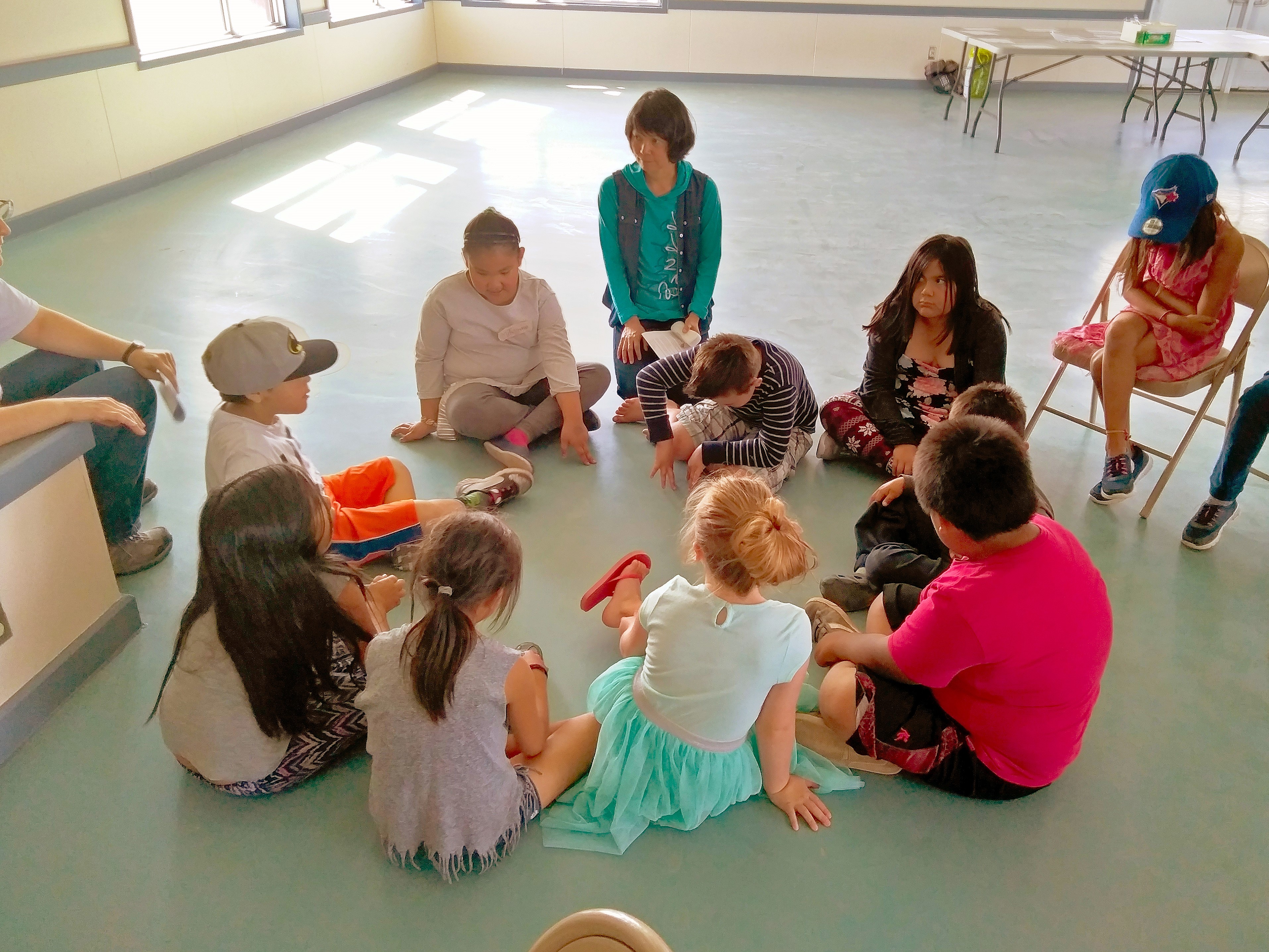 The people of that place are suffering from a difficult transition from tradition to modernity. “In the space of one generation,” Alek explains, “they found themselves entirely deprived of the roots that had been their deepest identity, perhaps for thousands of years. Those of my generation were born and lived in teepees, and speak Tlicho. Their grandchildren no longer speak the traditional language, use smartphones and are taken by consumerism and all its consequences, including alcohol and drugs. “Yet, the community is still driven by a simple, deep faith that is based on reading the Bible and the natural spirituality of its people, who are still sensitive to spiritual things. “For my part, it was a chance to meet face to face with some of these stories. With them I felt at home, perhaps as never before. I was also a way for them to be touched by God.”
The people of that place are suffering from a difficult transition from tradition to modernity. “In the space of one generation,” Alek explains, “they found themselves entirely deprived of the roots that had been their deepest identity, perhaps for thousands of years. Those of my generation were born and lived in teepees, and speak Tlicho. Their grandchildren no longer speak the traditional language, use smartphones and are taken by consumerism and all its consequences, including alcohol and drugs. “Yet, the community is still driven by a simple, deep faith that is based on reading the Bible and the natural spirituality of its people, who are still sensitive to spiritual things. “For my part, it was a chance to meet face to face with some of these stories. With them I felt at home, perhaps as never before. I was also a way for them to be touched by God.”
12 Nov 2018 | Focolare Worldwide
With an estimated 31 victims thus far, the huge fire that developed in California has broken the record as the worst burning in the history of the Golden State. An additional 220 people are still missing. The main fire that developed north of the capital of Sacramento is still partially out of control. In this area of the Sierra Nevada there has been very severe devastation. The town of Paradise with 27 thousand inhabitants was completely swept away by the flames, with a high number of victims, at least 14. There are two other smaller fronts further south between Los Angeles County and Ventura County. In total, more than 300 thousand people have been displaced from north to the south of the State. In the most affected areas, the scene appears ghostly, with woods and villages reduced to ash heaps and a few areas completely deserted. The strong winds of up to over 110 kilometres an hour, caused a spectacular and devastating “fire tornado” that incinerated everything in its path. This is just one of the umpteenth environmental disasters that have been happening all over the world because of climate change, but also because of the lack of care for the environment.
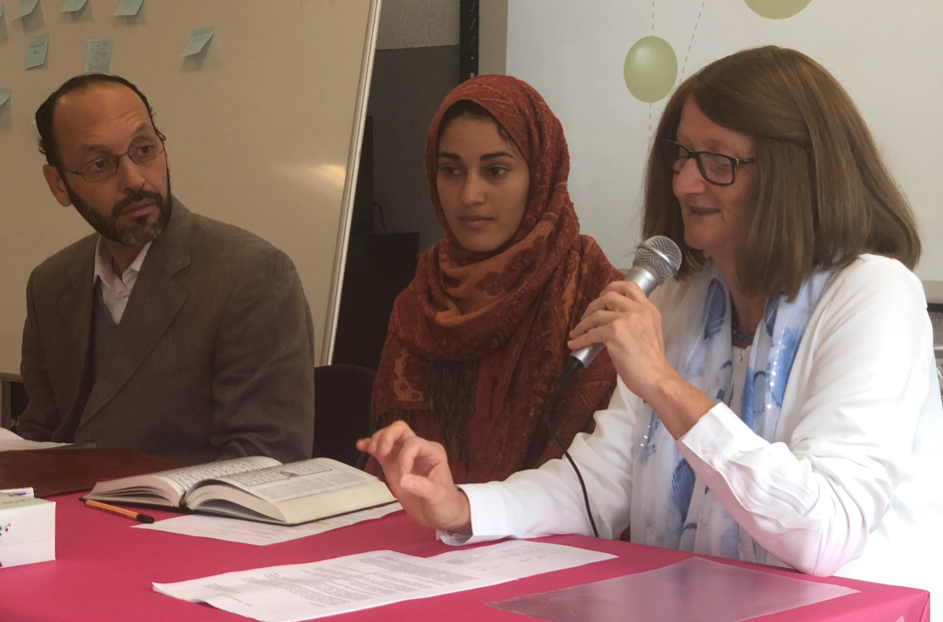
12 Nov 2018 | Focolare Worldwide
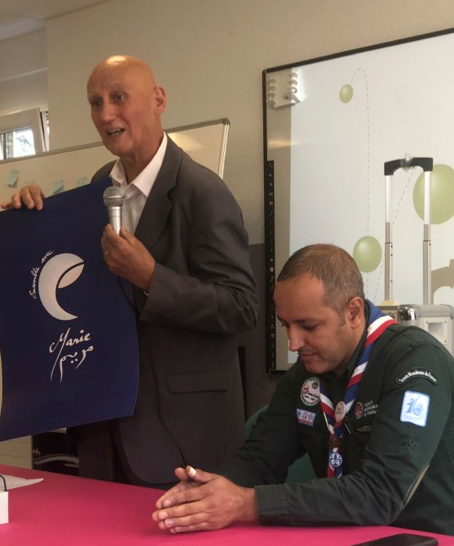 Indifference and mistrust are often born from fear and from a lack of knowledge about one another. In order to face the growing tensions of identity that undermine society, there are many very fruitful opportunities for dialogue and spiritual sharing created by religious institutions and associations. This is the case of Ensemble avec Marie (Together with Mary www.ensembleavecmarie.org) that grew from an experience in Lebanon and has spread through France, Belgium and several African nations, with the goal of promoting and facilitating a more fraternal society, through a more widespread and spiritual approach.” It is open to everyone who is seeking ways of peaceful togetherness while respecting freedom of worship and the right to be different. “Together with Mary” begins from the only woman who is mentioned by name 43 times in the Koran (an entire sura, one of the 114 divisions of the sacred writing is devoted to her) and from the account of the Annunciation, recognized as a true moment of encounter between the Koran and the Gospel. Both traditions, Christian and Muslim acknowledge the virginal conception of Jesus in the womb of Mary (Mariam), following the annunciation by the angel Gabriel (Jibril). The day in Lausanne opened with a reading of this sura on Mary in Arabic and French, followed by the Biblical account. “We are collaborating together for the building of a civilisation of love and peace, respecting the identity of each one,” said the president of the Association, Gérard Testard. The Focolare Movement, which is active in ecumenical and interreligious dialogue on a local and international level, is participating in this initiative. “The words dialogue, encounter and communion are essential for me. Both in a vertical and a horizontal direction. This is the reason why I’m committed to everything that helps to contribute to the unity and renewal of the Church,” says Martin Hoegger, member of the focolare community and pastor of the Reformed Evangelical Church in the Swiss Canton of Vaud, who attended the gathering.
Indifference and mistrust are often born from fear and from a lack of knowledge about one another. In order to face the growing tensions of identity that undermine society, there are many very fruitful opportunities for dialogue and spiritual sharing created by religious institutions and associations. This is the case of Ensemble avec Marie (Together with Mary www.ensembleavecmarie.org) that grew from an experience in Lebanon and has spread through France, Belgium and several African nations, with the goal of promoting and facilitating a more fraternal society, through a more widespread and spiritual approach.” It is open to everyone who is seeking ways of peaceful togetherness while respecting freedom of worship and the right to be different. “Together with Mary” begins from the only woman who is mentioned by name 43 times in the Koran (an entire sura, one of the 114 divisions of the sacred writing is devoted to her) and from the account of the Annunciation, recognized as a true moment of encounter between the Koran and the Gospel. Both traditions, Christian and Muslim acknowledge the virginal conception of Jesus in the womb of Mary (Mariam), following the annunciation by the angel Gabriel (Jibril). The day in Lausanne opened with a reading of this sura on Mary in Arabic and French, followed by the Biblical account. “We are collaborating together for the building of a civilisation of love and peace, respecting the identity of each one,” said the president of the Association, Gérard Testard. The Focolare Movement, which is active in ecumenical and interreligious dialogue on a local and international level, is participating in this initiative. “The words dialogue, encounter and communion are essential for me. Both in a vertical and a horizontal direction. This is the reason why I’m committed to everything that helps to contribute to the unity and renewal of the Church,” says Martin Hoegger, member of the focolare community and pastor of the Reformed Evangelical Church in the Swiss Canton of Vaud, who attended the gathering.  And Gwenaelle Dalalande, who is involved in interreligious dialogue, commented: “Talking about Mary as a model was a very vast topic. I made a choice and wanted to emphasise just a few aspects. Some moments of her life are able to enrich some of the moments in our lives. Regarding the Annunciation, I asked: ‘Are there perhaps moments of our lives that are annunciations?’ They are the moments when God manifests himself and we are called to respond to him. Chiara Lubich emphasises the connection between the Word of God and Mary, presenting her as the one who is “completely clothed with the Word.” In the end, I also shared a personal experience. Mary’s example and her perseverance through suffering helped me to overcome a very difficult period in my life. Renewing my yes to God as she had done, I rediscovered a new life.” Naceur Ghomraci, Imam and spiritual assistant at the jail in the Canton of Vaud: “The strength and commitment of Chiara Lubich are a great discovery for all the faithful. Her invitation to place at the basis of our actions the Golden Rule (Do to others as you would have them do to you, which is present in all religions) struck me very much. This is a project of God that all have to contribute to.” In his community they are in the process of building a new mosque. “I’d like it to be dedicated to Mary,” said the Imam who had attended the international congress of Muslims and Christians, organized by the Focolare Movement last April. Imam Abdel Ahid Kort, who runs the centre that hosted the gathering, described Mary as “a mystery, a fathomless ocean,” expressing the opinion of many Muslim exegetes: “A prophetess and a fulfilled woman, who brings us from an individual spirituality, her communion with God, to an active spirituality, the encounter with others; always animated by love. How did she overcome her trials? She did it in silence, in prayer and in altruism. She lived the real fasting: that of the heart, of words and of worldly vanities.” Who is her son, Jesus, for the Imam? “He is the smile and humility of my Christian brothers and sisters. He teaches me forgiveness and love for my enemy.
And Gwenaelle Dalalande, who is involved in interreligious dialogue, commented: “Talking about Mary as a model was a very vast topic. I made a choice and wanted to emphasise just a few aspects. Some moments of her life are able to enrich some of the moments in our lives. Regarding the Annunciation, I asked: ‘Are there perhaps moments of our lives that are annunciations?’ They are the moments when God manifests himself and we are called to respond to him. Chiara Lubich emphasises the connection between the Word of God and Mary, presenting her as the one who is “completely clothed with the Word.” In the end, I also shared a personal experience. Mary’s example and her perseverance through suffering helped me to overcome a very difficult period in my life. Renewing my yes to God as she had done, I rediscovered a new life.” Naceur Ghomraci, Imam and spiritual assistant at the jail in the Canton of Vaud: “The strength and commitment of Chiara Lubich are a great discovery for all the faithful. Her invitation to place at the basis of our actions the Golden Rule (Do to others as you would have them do to you, which is present in all religions) struck me very much. This is a project of God that all have to contribute to.” In his community they are in the process of building a new mosque. “I’d like it to be dedicated to Mary,” said the Imam who had attended the international congress of Muslims and Christians, organized by the Focolare Movement last April. Imam Abdel Ahid Kort, who runs the centre that hosted the gathering, described Mary as “a mystery, a fathomless ocean,” expressing the opinion of many Muslim exegetes: “A prophetess and a fulfilled woman, who brings us from an individual spirituality, her communion with God, to an active spirituality, the encounter with others; always animated by love. How did she overcome her trials? She did it in silence, in prayer and in altruism. She lived the real fasting: that of the heart, of words and of worldly vanities.” Who is her son, Jesus, for the Imam? “He is the smile and humility of my Christian brothers and sisters. He teaches me forgiveness and love for my enemy.
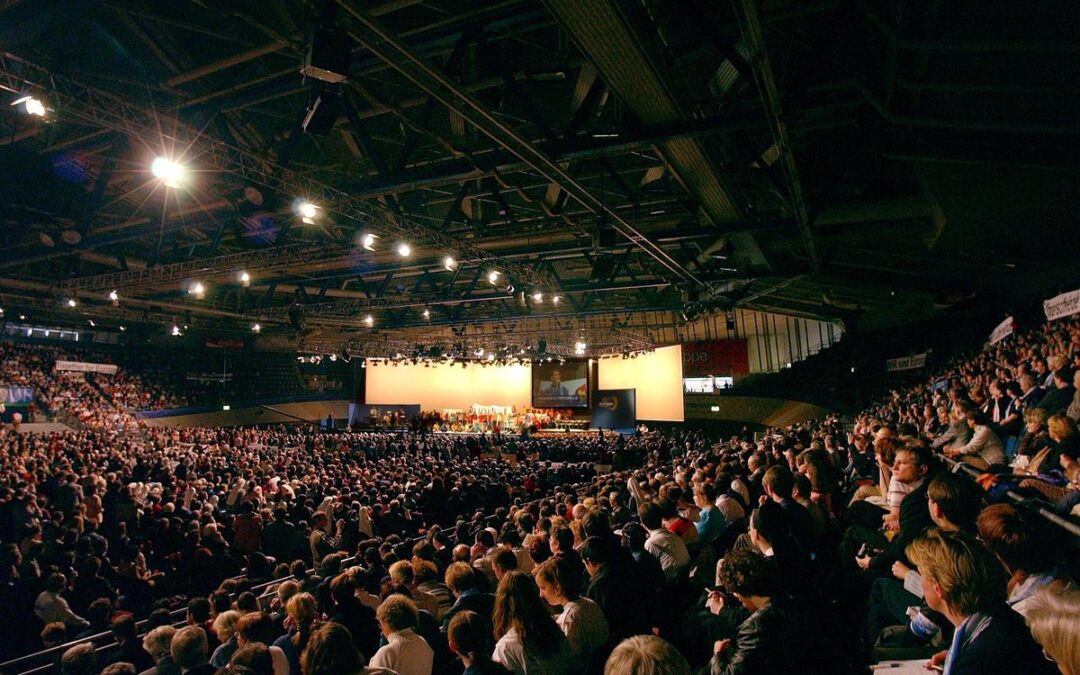
10 Nov 2018 | Focolare Worldwide
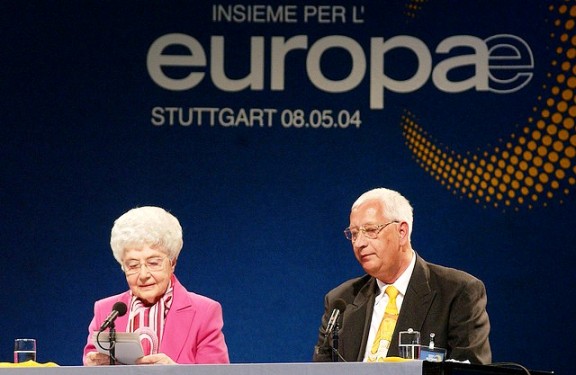 «Universal brotherhood was also the project of people who were not motivated by religious motives, but simply by the desire to benefit humanity. The French Revolution’s motto: “liberty, equality, fraternity”, summarizes the great political project of modernity, a project which, in part, has been disregarded. While numerous countries have built democratic systems of government and have succeeded in achieving some degree of liberty and equality, the same cannot be said of fraternity which has been proclaimed more than it has been lived. But the one who brought fraternity as the essential gift to humanity was above all Jesus. In revealing the fatherhood of God, He broke down the walls which separate those who are “the same” from those who are “different”, friends from enemies. He loosened all people from the bonds that imprison them, from all forms of slavery and subordination, from every unjust relationship, thus carrying out an authentic existential, cultural and political revolution. (…) The instrument that Jesus offered to us in order to accomplish this universal fraternity was love, a great love, a new love, different from the one we usually know. In fact, He transplanted the way of loving of heaven here on earth. This love requires first of all that we love everyone, therefore, not only relatives and friends. It asks that we love the pleasant and the unpleasant, our fellow-countryman and the stranger, the European and the immigrant, those of our Church and of another, of our religion and of another. Today it asks the countries of Western Europe to love those of Central and Eastern Europe – and vice versa – and it asks everyone to be open to those of other continents. In the vision of its founders, in fact, Europe is a family of sister nations, not closed in itself, but open to a universal mission: Europe wants its unity to contribute, then, to the unity of the human family. This love asks that we love our enemies as well and that we forgive them if they have offended us. After the wars which stained our continent with blood, many Europeans were exemplary in loving their enemies and promoting reconciliation.
«Universal brotherhood was also the project of people who were not motivated by religious motives, but simply by the desire to benefit humanity. The French Revolution’s motto: “liberty, equality, fraternity”, summarizes the great political project of modernity, a project which, in part, has been disregarded. While numerous countries have built democratic systems of government and have succeeded in achieving some degree of liberty and equality, the same cannot be said of fraternity which has been proclaimed more than it has been lived. But the one who brought fraternity as the essential gift to humanity was above all Jesus. In revealing the fatherhood of God, He broke down the walls which separate those who are “the same” from those who are “different”, friends from enemies. He loosened all people from the bonds that imprison them, from all forms of slavery and subordination, from every unjust relationship, thus carrying out an authentic existential, cultural and political revolution. (…) The instrument that Jesus offered to us in order to accomplish this universal fraternity was love, a great love, a new love, different from the one we usually know. In fact, He transplanted the way of loving of heaven here on earth. This love requires first of all that we love everyone, therefore, not only relatives and friends. It asks that we love the pleasant and the unpleasant, our fellow-countryman and the stranger, the European and the immigrant, those of our Church and of another, of our religion and of another. Today it asks the countries of Western Europe to love those of Central and Eastern Europe – and vice versa – and it asks everyone to be open to those of other continents. In the vision of its founders, in fact, Europe is a family of sister nations, not closed in itself, but open to a universal mission: Europe wants its unity to contribute, then, to the unity of the human family. This love asks that we love our enemies as well and that we forgive them if they have offended us. After the wars which stained our continent with blood, many Europeans were exemplary in loving their enemies and promoting reconciliation. 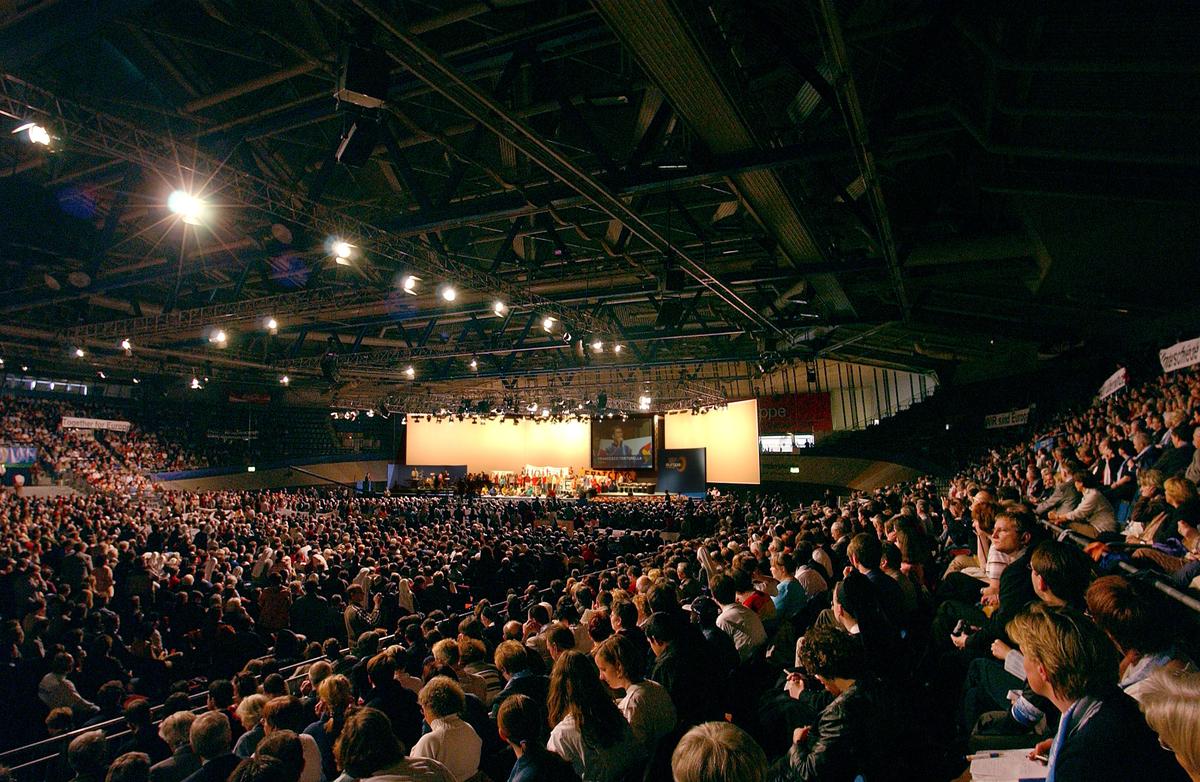 Therefore, the love I am speaking of makes no distinctions and takes into consideration all those we meet in any moment, directly or indirectly: those who are next to us physically, but also those about whom we or others are speaking; those who will receive the work we do day by day, those we come to know about through the newspapers or television…. Because this is the way God our Father loves, making the sun rise on the bad and the good, and causing the rain to fall on the just and the unjust alike (cf Mt 5:45). (…) Furthermore, the love that Jesus brought is not an idealistic, sentimental love, made up of words. It is a concrete love. It needs to be expressed with deeds. And this is possible if we make ourselves all things to all people: sick with those who are sick; joyful with those who are joyful; worried, insecure, hungry, poor with others, feeling in ourselves what they feel and acting accordingly». Chiara Lubich, Stuttgart 8th May 2004
Therefore, the love I am speaking of makes no distinctions and takes into consideration all those we meet in any moment, directly or indirectly: those who are next to us physically, but also those about whom we or others are speaking; those who will receive the work we do day by day, those we come to know about through the newspapers or television…. Because this is the way God our Father loves, making the sun rise on the bad and the good, and causing the rain to fall on the just and the unjust alike (cf Mt 5:45). (…) Furthermore, the love that Jesus brought is not an idealistic, sentimental love, made up of words. It is a concrete love. It needs to be expressed with deeds. And this is possible if we make ourselves all things to all people: sick with those who are sick; joyful with those who are joyful; worried, insecure, hungry, poor with others, feeling in ourselves what they feel and acting accordingly». Chiara Lubich, Stuttgart 8th May 2004





 It was a lake so clear you could see the bottom and drink the water with your cupped hands from the canoe. It seemed the perfect world. Yet here and there a plastic bottle was stuck in the bank, held down by low roots. In that extraordinarily beautiful landscape, it was a punch in the eye. Alek’s story is rich with images such as this. He was among the four people who were part of a temporary Focolare at Whati, in
It was a lake so clear you could see the bottom and drink the water with your cupped hands from the canoe. It seemed the perfect world. Yet here and there a plastic bottle was stuck in the bank, held down by low roots. In that extraordinarily beautiful landscape, it was a punch in the eye. Alek’s story is rich with images such as this. He was among the four people who were part of a temporary Focolare at Whati, in  With the youth group, Alek and Fr. Alain organized the cleanup of a stretch of shoreline. “It was just a gesture,” he says, “yet afterwards we heard that one of the residents there brought this to the chief’s attention, and the cleanup has now become a regular activity throughout the year.” This too was a result of the temporary Focolare at Whati. Besides Alek (an Italian who lives in Birmingham, Alabama) and Fr. Alain (a priest from Montreal), the group was made up of Lioba from the Focolare of Vancouver and Ljubica from that of Toronto. The reason for their journey was a request from the bishop of Yellowknife, the capital of the Northwest Territories, to have a few people from the Focolare community come to the area (covering the costs) to give the residents, at least for one month of the year, the chance to come together spiritually and receive some training on Gospel living. At the same time, another group was having a similar experience at the village of Fort Resolution.
With the youth group, Alek and Fr. Alain organized the cleanup of a stretch of shoreline. “It was just a gesture,” he says, “yet afterwards we heard that one of the residents there brought this to the chief’s attention, and the cleanup has now become a regular activity throughout the year.” This too was a result of the temporary Focolare at Whati. Besides Alek (an Italian who lives in Birmingham, Alabama) and Fr. Alain (a priest from Montreal), the group was made up of Lioba from the Focolare of Vancouver and Ljubica from that of Toronto. The reason for their journey was a request from the bishop of Yellowknife, the capital of the Northwest Territories, to have a few people from the Focolare community come to the area (covering the costs) to give the residents, at least for one month of the year, the chance to come together spiritually and receive some training on Gospel living. At the same time, another group was having a similar experience at the village of Fort Resolution. 
 The people of that place are suffering from a difficult transition from tradition to modernity. “In the space of one generation,” Alek explains, “they found themselves entirely deprived of the roots that had been their deepest identity, perhaps for thousands of years. Those of my generation were born and lived in teepees, and speak Tlicho. Their grandchildren no longer speak the traditional language, use smartphones and are taken by consumerism and all its consequences, including alcohol and drugs. “Yet, the community is still driven by a simple, deep faith that is based on reading the Bible and the natural spirituality of its people, who are still sensitive to spiritual things. “For my part, it was a chance to meet face to face with some of these stories. With them I felt at home, perhaps as never before. I was also a way for them to be touched by God.”
The people of that place are suffering from a difficult transition from tradition to modernity. “In the space of one generation,” Alek explains, “they found themselves entirely deprived of the roots that had been their deepest identity, perhaps for thousands of years. Those of my generation were born and lived in teepees, and speak Tlicho. Their grandchildren no longer speak the traditional language, use smartphones and are taken by consumerism and all its consequences, including alcohol and drugs. “Yet, the community is still driven by a simple, deep faith that is based on reading the Bible and the natural spirituality of its people, who are still sensitive to spiritual things. “For my part, it was a chance to meet face to face with some of these stories. With them I felt at home, perhaps as never before. I was also a way for them to be touched by God.”
 Indifference and mistrust are often born from fear and from a lack of knowledge about one another. In order to face the growing tensions of identity that undermine society, there are many very fruitful opportunities for dialogue and spiritual sharing created by religious institutions and associations. This is the case of
Indifference and mistrust are often born from fear and from a lack of knowledge about one another. In order to face the growing tensions of identity that undermine society, there are many very fruitful opportunities for dialogue and spiritual sharing created by religious institutions and associations. This is the case of 
 «Universal brotherhood was also the project of people who were not motivated by religious motives, but simply by the desire to benefit humanity. The French Revolution’s motto: “liberty, equality, fraternity”, summarizes the great political project of modernity, a project which, in part, has been disregarded. While numerous countries have built democratic systems of government and have succeeded in achieving some degree of liberty and equality, the same cannot be said of fraternity which has been proclaimed more than it has been lived. But the one who brought fraternity as the essential gift to humanity was above all Jesus. In revealing the fatherhood of God, He broke down the walls which separate those who are “the same” from those who are “different”, friends from enemies. He loosened all people from the bonds that imprison them, from all forms of slavery and subordination, from every unjust relationship, thus carrying out an authentic existential, cultural and political revolution. (…) The instrument that Jesus offered to us in order to accomplish this universal fraternity was love, a great love, a new love, different from the one we usually know. In fact, He transplanted the way of loving of heaven here on earth. This love requires first of all that we love everyone, therefore, not only relatives and friends. It asks that we love the pleasant and the unpleasant, our fellow-countryman and the stranger, the European and the immigrant, those of our Church and of another, of our religion and of another. Today it asks the countries of Western Europe to love those of Central and Eastern Europe – and vice versa – and it asks everyone to be open to those of other continents. In the vision of its founders, in fact, Europe is a family of sister nations, not closed in itself, but open to a universal mission: Europe wants its unity to contribute, then, to the unity of the human family. This love asks that we love our enemies as well and that we forgive them if they have offended us. After the wars which stained our continent with blood, many Europeans were exemplary in loving their enemies and promoting reconciliation.
«Universal brotherhood was also the project of people who were not motivated by religious motives, but simply by the desire to benefit humanity. The French Revolution’s motto: “liberty, equality, fraternity”, summarizes the great political project of modernity, a project which, in part, has been disregarded. While numerous countries have built democratic systems of government and have succeeded in achieving some degree of liberty and equality, the same cannot be said of fraternity which has been proclaimed more than it has been lived. But the one who brought fraternity as the essential gift to humanity was above all Jesus. In revealing the fatherhood of God, He broke down the walls which separate those who are “the same” from those who are “different”, friends from enemies. He loosened all people from the bonds that imprison them, from all forms of slavery and subordination, from every unjust relationship, thus carrying out an authentic existential, cultural and political revolution. (…) The instrument that Jesus offered to us in order to accomplish this universal fraternity was love, a great love, a new love, different from the one we usually know. In fact, He transplanted the way of loving of heaven here on earth. This love requires first of all that we love everyone, therefore, not only relatives and friends. It asks that we love the pleasant and the unpleasant, our fellow-countryman and the stranger, the European and the immigrant, those of our Church and of another, of our religion and of another. Today it asks the countries of Western Europe to love those of Central and Eastern Europe – and vice versa – and it asks everyone to be open to those of other continents. In the vision of its founders, in fact, Europe is a family of sister nations, not closed in itself, but open to a universal mission: Europe wants its unity to contribute, then, to the unity of the human family. This love asks that we love our enemies as well and that we forgive them if they have offended us. After the wars which stained our continent with blood, many Europeans were exemplary in loving their enemies and promoting reconciliation.  Therefore, the love I am speaking of makes no distinctions and takes into consideration all those we meet in any moment, directly or indirectly: those who are next to us physically, but also those about whom we or others are speaking; those who will receive the work we do day by day, those we come to know about through the newspapers or television…. Because this is the way God our Father loves, making the sun rise on the bad and the good, and causing the rain to fall on the just and the unjust alike (cf Mt 5:45). (…) Furthermore, the love that Jesus brought is not an idealistic, sentimental love, made up of words. It is a concrete love. It needs to be expressed with deeds. And this is possible if we make ourselves all things to all people: sick with those who are sick; joyful with those who are joyful; worried, insecure, hungry, poor with others, feeling in ourselves what they feel and acting accordingly».
Therefore, the love I am speaking of makes no distinctions and takes into consideration all those we meet in any moment, directly or indirectly: those who are next to us physically, but also those about whom we or others are speaking; those who will receive the work we do day by day, those we come to know about through the newspapers or television…. Because this is the way God our Father loves, making the sun rise on the bad and the good, and causing the rain to fall on the just and the unjust alike (cf Mt 5:45). (…) Furthermore, the love that Jesus brought is not an idealistic, sentimental love, made up of words. It is a concrete love. It needs to be expressed with deeds. And this is possible if we make ourselves all things to all people: sick with those who are sick; joyful with those who are joyful; worried, insecure, hungry, poor with others, feeling in ourselves what they feel and acting accordingly».